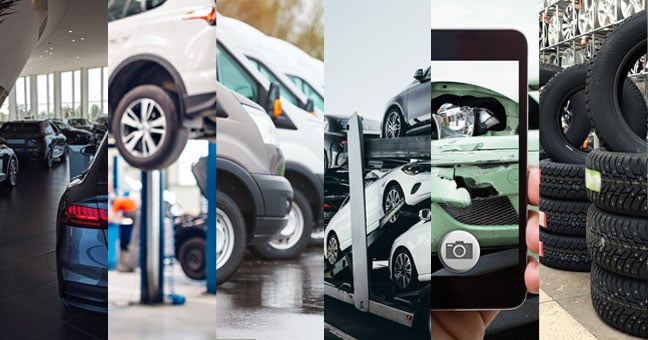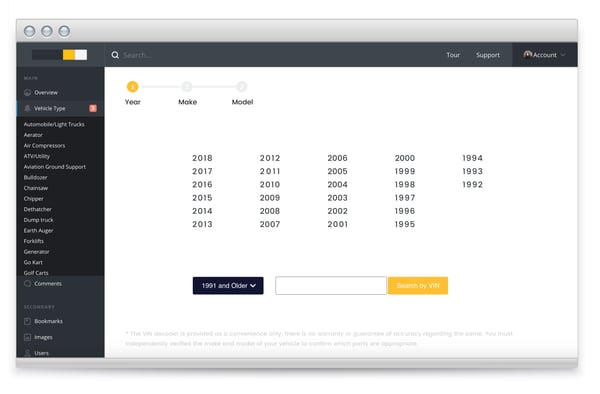

Oct 7 2021
In a previous article, we discussed how businesses can leverage a commercial VIN decoding solution to identify vehicle specs by VIN, as well as which specs are often included. In this article, we are going to dive into which businesses benefit from this functionality. The short answer is just about any industry that has anything to do with vehicles, their maintenance, financing, insurance, or transportation. Here’s a deeper dive into some of the most popular use cases for vehicle specs identification by VIN:
Automotive retail is probably the broadest of use cases. This is because identification of vehicle specifications by VIN is not only valuable, but essential for any business involved with advertising or selling vehicles, supporting inventory management, providing vehicle research/shopping tools, or retail solutions.
Businesses in the vehicle retail space will need to identify all types of vehicle specs including construction, operation, and performance for displaying to consumers via their website or window stickers. The more detailed your vehicle listings are, the greater chance you have of beating out your competitors.
Leveraging a VIN decoding solution is the most effective and accurate way to identify these specs. However, it’s important that the VIN decoder you implement can decode more than what’s encoded in the VIN pattern alone. Check out our blog article “Why You Shouldn't Settle for a VIN Decoder That Just Decodes the VIN” to learn more on that subject.
Whether generating auto insurance quotes, underwriting insurance policies, or submitting claims, a VIN decoding solution will be needed. For the quoting process, it’s important that the VIN decoding provider can support reverse VIN lookup, generating a VIN pattern for carriers from a handful of form field drops downs (year, make, model, trim, body style, etc.). After all, the average vehicle owner will not have their VIN handy when shopping for auto insurance.
Identification of vehicle specs by VIN is necessary for assessing the risk of a driver and their vehicle before starting a policy. A VIN decoding solution will assure that your underwriters are utilizing accurate and complete vehicle information. This is especially helpful when determining if the vehicle being insured has preventive safety features installed, such as autonomous braking, blind-spot detection, cross-traffic alert, as these features will lower the insurance premium.
Here’s are a couple of articles to reference from our blog on 1) the value of VIN decoding for the quoting process and 2) the value of VIN decoding for the underwriting process.
Fleet managers handle all aspects of vehicle management including vehicle financing, ongoing maintenance, vehicle tracking, and insurance. While managing a fleet consisting of a few vehicles can easily be done without a VIN decoding solution, management of fleets much larger in size -hundreds or even thousands- becomes a much more complicated task, especially without the right tools. The ability to pull vehicle specs by VIN for all body styles helps contribute to a well-managed fleet.
The process of
Vehicle specifications are also important for financing, maintenance tracking, budgeting fuel cost, and other necessary tasks in fleet management. Innovative fleet management companies are integrating a VIN decoder into their software solutions, as it's a quick way to identify vehicle specs and determine the costs associated.
Check out our post "Four Benefits of Adding a VIN decoder to Your Fleet Management Software" if you are interested in learning more about implementing a VIN decoder for your fleet solutions.
Vehicle transport is another segment of the automotive industry that can benefit from identifying vehicle specs by VIN.
Two of the core vehicle specs necessary for transport logistics
Identifying vehicle specifications by VIN also allows transportation companies to quickly quote shipment costs and give proper insurance coverage upfront before carrying out the service. This is especially beneficial to the customer service department providing this information to customers.
Many vehicle transportation companies realize the benefits a VIN decoder offers
Any type of vehicle maintenance and repair business, whether fixed ops or a private auto body shop, requires vehicle specs for many of their services. Some of these specs may include exterior and interior dimensions, engine details, transmission details, color codes, installed equipment, etc.
For shops dealing with a number of
Some advanced vehicle data solutions will map their vehicle IDs to third-party resources like OEM service schedules and recall information. This is very valuable data for dealers looking to increase customer retention by marketing their fixed ops services, as well as an efficient way to identify important recalls.
As mentioned in the introduction, much of this information can be accessed through various resources but can be time-consuming when dealing with a number of OEMs. Most high-volume service and repair shops rely on some sort of VIN decoding solution to better maximize productivity.
 The use of a VIN decoder to identify vehicle specs for replacing parts or vehicle customization is valuable for both the seller and consumer. This might include your local/corporate auto parts stores, like NAPA and Autozone, or tire dealers such as Town Fair Tire and Hogan Tire. A VIN decoder can be used both internally in the store's system or consumer-facing on their websites, in addition to Year Make Model lookup.
The use of a VIN decoder to identify vehicle specs for replacing parts or vehicle customization is valuable for both the seller and consumer. This might include your local/corporate auto parts stores, like NAPA and Autozone, or tire dealers such as Town Fair Tire and Hogan Tire. A VIN decoder can be used both internally in the store's system or consumer-facing on their websites, in addition to Year Make Model lookup.
Most VIN decoder solutions will just cover core specifications data, like vehicle weights, dimensions, fluid capacities, etc., and will generate a vehicle ID that can map to a 3rd party aftermarket parts solution, such as AutoCare Association's ACES. When the use case is just to identify wheel and tire dimensions, a VIN decoding solution might be all you need.
For auto parts and tire dealers looking to access this information quickly and accurately for both themselves and their users, plugging a VIN into the system can be the simplest option.
Though auto retail, insurance, fleet management, vehicle transport logistics, service/maintenance, auto part dealers are the most common use cases for vehicle specs identification, there are many other sectors of the auto industry that benefit from a VIN decoder solution. If your company operates in the automotive or allied industries, incorporating commercially available VIN decoding can help your company streamline its business processes while increasing the accuracy of vehicle spec identification.
To integrate this valuable data technology, you have a couple of options. You can license a delivered VIN database, house it on your own server, and create queries to pull the data you are looking for. Another option is to use a web service or delivered API that will accept the VIN, as well as other inputs, and return the VIN-specific information you are looking to acquire. Both options have their benefits with the web service providing quicker integration and less development on your end. In addition, many businesses choose a hybrid approach and incorporate both delivered data along with a VIN decoder API to meet their diverse data needs.
Interested in VIN decoding for your business? Want to learn more so you can choose the right service for your needs? Below are links to a number of articles that you will find helpful:
VIN Decoding 101: All that you need to know about vehicle identification numbers
Choosing the right VIN decoder for your business
Some additional best practice articles:
Decoding Vehicles to a Single Style